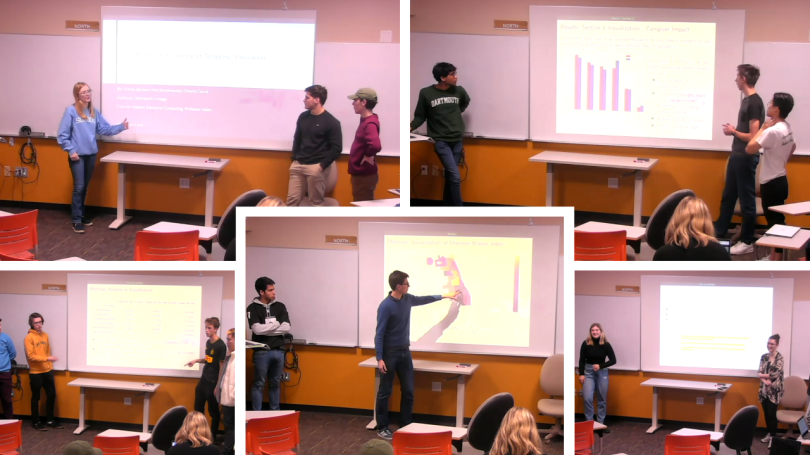
- Undergraduate
- Research
- About the Program
- News & Events
- People
Back to Top Nav
Back to Top Nav
Back to Top Nav
Back to Top Nav
On November 14, 2022, students presented their final projects for QSS 20, Modern Statistical Computing, a core class in the Program in Quantitative Social Science. Each group of students in QSS 20 selected a data source to investigate, developed a focused research question, and carried out a scientific analysis that applied the programming skills developed through a quarter of dynamic, hands-on learning.
QSS 20 builds on introductory programming skills to equip students with the computing literacy to conduct social science research in the age of big data. The course focuses on learning modern packages for diverse approaches to data manipulation through the flexible language of Python, such as text analysis with nltk and machine learning with scikit-learn. QSS 20 also teaches the foundational computer skills needed in today's computing-intensive environment, including Git/Github; LaTeX; and the command line.
The course collaborated with the Dartmouth Center for Social Impact and a partner organization, the National Center for START Services (NCSS), to integrate a Social Impact Practicum (SIP) as an option for students' final projects. The SIP allowed students to use their emerging programming skills to promote social good, namely by improving service delivery to and understanding the experiences of individuals with Intellectual and Developmental Disabilities (IDD). Topics ranged from programs for medical students to understand IDD patients, to caregiver experiences throughout the pandemic, to variation in aggression and police encounters across participants' racial groups. Other student groups analyzed sentencing disparities using open data from Cook County, Illinois.
QSS 20 was taught by Postdoctoral Fellow Jaren Haber.
These are the student groups, their members, and research questions:
|
Final project team |
Research question(s) |
Name |
|
SIP: Training A |
Are the learning modules generally effective for improving medical students' understanding of IDD-MH patients? And which specific topics showed the most or least improvement? |
Saige Gitlin |
|
Kayla Hamann |
||
|
Rachael Williams |
||
|
SIP: Training B |
- Are students satisfied with the course? |
Omario Corral-Williams |
|
Emma Johnson |
||
|
Max Konzerowsky |
||
|
SIP: SIRS |
- How were caregivers of START patients affected before and after COVID-19? |
Andrew Cho |
|
Justin Sapun |
||
|
Anish Sikhinam |
||
|
Felony sentencing A |
What was the impact of the 2020 Presidential Election on the amount of crime in Washington D.C.? |
Luca D'Ambrosio |
|
Filippo de Min |
||
|
Nick Romans |
||
|
Felony sentencing B |
- Is there a significant difference (if any) in incarceration rates between nonwhite defendants and white defendants? |
Daniel Céspedes |
|
Giulio Frey |
||
|
Andy Ilie |